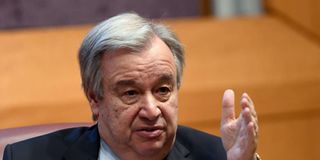Woman-led UN: Will lobbyists get it right this time round?

United Nations Secretary-General Antonio Guterres. During the opening the 67th session of the Commission on the Status of Women on March 6, 2023.
What you need to know:
- The search for equality has not been reflected through the UN, the symbol of promotion and protection of human rights.
- An analysis of the UN's leadership by Women Leaders Voices for Change and Inclusion nearly eight decades later exposes the irony of the system.
The United Nations (UN) came into existence in 1945, but for nearly 80 years, a woman has never been selected to head the intergovernmental organisation, which, in principle, stands for equal rights of men and women.
The search for equality has not been reflected through the UN, the symbol of promotion and protection of human rights. An analysisof the UN's leadership by Women Leaders Voices for Change and Inclusion (GWL-Voices) nearly eight decades later exposes the irony of the system.
GWL-Voices mapped the number of women who have headed 33 organisations of the UN system from 1945, at the inception of the UN, to 2020.
It found that out of the 382 leaders who had steered the entities, 87.7 per cent of them were men, equivalent to 335. Women represented only 12.3 per cent, equal to 47.
Only four times have the representatives to the General Assembly elected a woman to lead the policymaking organ.
The presidency follows a geographical rotation to ensure each region across the world holds the position.
The president of the General Assembly heads the annual sessions of the assembly, often held from September to December.
Africa has had representation through Angie Brooks of Liberia (1969), elected after India’s Vijaya Lakshmi Pandit (1953).
Nearly four decades later, Sheikha Haya Rashed Al-Khalifa from Bahrain (2006) was elected. Eleven years passed, and in the 12th year, Maria Fernando Espinosa Garces from Ecuador (2018) was elected.
In 2016, the ultimate election of Portugal's António Guterres as the Secretary-General (SG) to the UN was a disappointment to women across the world. Seven women vied for the position against six men.
Then, according to the BBC, the Campaign to Elect a Woman UN Secretary-General, composed mainly of academics, termed Guterres’ selection an “outrage”.
Power and influence
Power and politics heavily determine decisions on the next SG as they are appointed by the General Assembly only after the endorsement of the 15-member Security Council that can be vetoed by any of the permanent members (China, France, Russia, United Kingdom, and the United States).
The five must all agree to a woman SG, otherwise if just one of them disapproves, then the candidate is dropped.
TheUN Association in the UK details the selection of an SG, a key factor being the the backroom deals.
It says: “One of the most visible types of backroom deals was articulated by UN inspectors in 2011 when they wrote that ‘no Secretary-General had been immune to political pressure’ to reserve certain top UN jobs for certain member states.
“This refers to the unfortunate practice of major powers extracting promises from candidates in return for their support.”
Politico, too, in its September 22, 2016 article, indicated that Russia and the US held the key to the appointment. “Whoever wins the race will have had to carefully negotiate the support (or at least avoid the opposition) of both the United States and Russia,” it wrote.
However, women leaders are not giving up. They have already started lobbying for a woman SG ahead of the end of Mr Guterres’ second term in 2026.
Through GWL-Voices, the women say the world cannot wait any longer for a woman-led UN.
“There is no space to even consider that this is not going to happen,” Susana Malcorra, the president and co-founder of GWL Voices told France 24 through its show 51% on January 5, 2024.
“We just must make this a reality for the United Nations.”
The former Argentina Minister of Foreign Affairs, who also served as chief of staff to the UN Secretary-General Ban Ki-moon, said having a woman at the helm of the UN would bring a new perspective to tackling global problems.
“The United Nations is a significant place of power,” she said.
“It has influence and has an importance in large geopolitics, in peace and security, in development, in humanitarian, in human rights, and not having a woman at the helm means having only a partial perspective on how to handle all those issues.”





